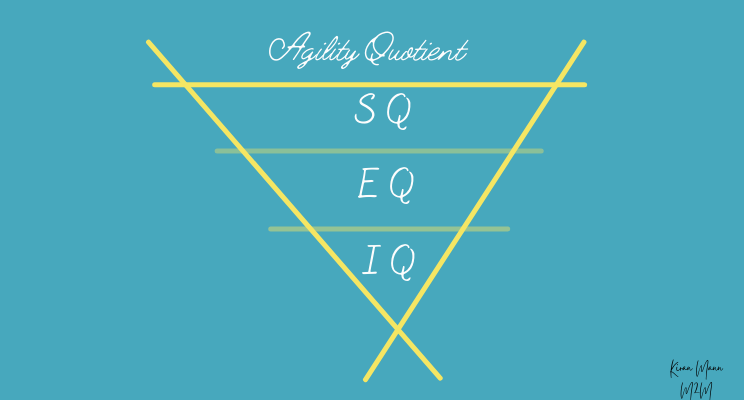In my previous article, I explained the importance of enterprise agility and how AQ or Agility Quotient is an amalgamation of IQ, EQ, and SQ. Check it out if you haven’t read it yet.
As promised, I am back with some practical tips on how business leaders and organizations can develop these different facets of intelligence to become more agile and continue leading.
The Changing Face of Knowing Yourself
To know thyself is the beginning of all wisdom – Socrates
While this quote from the great Greek philosopher has stood the test of time, the meaning of ‘knowing yourself’ has changed multiple times, especially in the last few decades.
It started with IQ (Intelligence Quotient) in the early 1900s, classifying people as per their ability to acquire knowledge, learn, and think rationally. In the 1980s, it progressed to EQ (Emotional Intelligence), a concept that revolves around a person’s ability to manage emotions and being empathetic.
In her 1997 book, Rewiring the Corporate Brain, Danah Zohar then coined the term ‘spiritual intelligence’. While IQ and EQ are critical for leaders and organizations, it is SQ that offers the necessary respite of leading in the VUCA world.
With a higher SQ, leaders can attain a better understanding of all the volatility, uncertainty, complexity, and ambiguity (VUCA), which improves their decision-making capabilities.
One of the most effective ways for leaders and organizations to become more agile is to improve these various aspects of intelligence.
Here are a few tips that have done wonders for the businesses I’ve had the pleasure of working with-
Improving IQ- Is it Possible?
A question I often come across is if it is even possible to improve someone’s IQ? Isn’t IQ something that people are born with or something that develops naturally? Not really.
A person’s IQ can change with time. While the popular IQ tests might provide the same score for a significant period, sometimes even years, multiple studies have proved that people can be made smarter, and their IQs can be improved.
However, here is an interesting thing I’d like to share.
In most of these studies, the IQ was not improved by making people more intelligent but rather enabling them to function better. In other words, improving IQ is not the process of making people more intelligent but helping them use what they already have- more efficiently. I would rather say- building cognitive ability.
Here are a few ways business leaders and decision-makers can improve their (IQ) cognitive ability.
Optimizing Executive Function of Your Brain
The Prefrontal Cortex or PFC is home to your executive brain. Top leadership qualities, such as reasoning, collaboration, creativity, and thinking, come from PFC. A common problem with most leaders and decision-makers is that they start depending on a single hemisphere of their brain, limiting their ability to lead and reach new heights.
Leaders who are aware of their goals and in complete control of their responses, well-being, and thoughts are able to utilize both hemispheres of their brain, resulting in improved leadership IQ.
- Learn a new skill related to your work environment- join a course, enrol in an up-skilling program, or initiate a new mentorship program in your company.
- Learn a new skill(s) unrelated to your work that enables your brain to navigate through a new set of rules, such as learning a new language, learning swimming, or even a new musical instrument.
From Response-Ability to Response-Agility
How appropriately and in a controlled manner someone responds to a breakdown or stress determines their response agility. While it can be very challenging to control your anger, frustration, or fear at times, especially during events like the current COVID pandemic, leaders should train themselves to think every time before reacting.
Awareness of the situation and correct response are two critical aspects of being more agile with your responses. This can help leaders better respond to the challenges and make decisions that benefit their organization, irrespective of how volatile or uncertain the situation is.
- Journal your thoughts and activities that help you analyse and better your response agility.
- Create a set of principles and value systems that can guide you through stressful situations rather than depending on your ‘monkey-mind.
Building Your EQ
While the concept of improving your IQ to become a better leader is easy to comprehend, how can EQ help? If we were robots, our IQ might have been the only thing that mattered. But as humans, our decisions are abundantly driven by our emotions. People with higher EQs are better able to manage their emotions, leading to improved performance and decision-making.
While a higher IQ can make you a good engineer, you will also need high EQ if you were to manage or lead a group of such engineers. In fact, a 40-year study by PhDs from UC Berkley found that EQ was 400% more effective than IQ in predicting people who will have a successful career.
So, how do you improve your EQ? Here are a few tips-
Perfection is the Biggest Enemy of a Leader
Over the years, I have worked with hundreds of small and large businesses and noticed that the difference between a good leader and a great leader is the focus of the latter on not being a perfect leader. Top performers do not mind asking for help when they need it. They are also the first to admit if they end up making a mistake.
Great leaders focus on addressing the situation and moving on rather than punishing themselves or others around them. The goal is to be resilient and not be fearful of failures or mistakes.
- Stay away from micro-management. Delegate goals, not just tasks.
- Check out my e-book “The Resilient Leader” to know more
Be Generous, Be a Go-Giver
Being more generous is another way to improve your EQ. Generous leaders create a work environment where people around them feel like they are part of the inner circle. Generously and freely sharing your expertise, know-how, and ideas will not only help the employees but is also an excellent way to conduct business.
Try to better understand the people around you, their ideas, and problems, as this will help create a more positive work environment.
- Read the book “Go-Giver Leader” by Bob Burg and John David Mann.
- Remember, you can only give if you can grow.
The Ultimate Intelligence – The Spiritual Quotient
In their book, ‘Spiritual Intelligence- The Ultimate Intelligence’, Danah Zohar and Ian Marshal have mentioned that “While computers have IQ and animals can have EQ, it is essentially an SQ that sets human beings apart.”
With more and more organizations now working towards improving SQ at the workplace by conducting awareness seminars, the values, beliefs, attitudes, and ethics of the people involved are given their due importance rather than simply focusing on the mission statements.
How can leaders and organizations improve their SQ?
Openly Recognize Spirituality
Communications at work revolve around deadlines, innovations, profitability, and even personnel problems. To improve SQ, the first thing that should be done is to create a work environment where people can openly discuss spirituality just like any other conversation.
- The HR department can work towards integrating SQ development into their employee engagement strategies.
- Organizational objectives can be redesigned with a touch of spirituality and humanity.
Meditation at Workplace
Global companies such as Nike, Google, Sony, Facebook, Apple, HBO, and many others have already embraced the idea of meditation at workplaces for improved employee productivity and creating a happier workplace environment. Multiple studies suggest that meditation offers a wide range of mental and physical benefits.
From Reducing stress to improving decision-making skills, listening skills and even boosting employee engagement, meditation offers a host of valuable benefits that can help an organization grow.
- Initiate meditation programs at the workplace or online meditation programs (now) for your team.
- Many successful leaders such as Jeff Weiner (CEO of LinkedIn) and many others make it a point to meditate every day.
Improving IQ, EQ, and SQ to Boost AQ
As AQ is an amalgamation of IQ, EQ, and SQ, improving these facets of intelligence is the most effective way for leaders and organizations to become more agile.
At M2M, our training programs effectively target each of these aspects of intelligence to help leaders and decision-makers grow and succeed.
Schedule a no-obligation information session to know more about our training programs to better understand the critical role of AQ and how working on your intelligence, emotions, and spirituality can help you become a better leader.
Hope this article helps you build agile leadership teams.
What are some of the ways you suggest to improve EQ, IQ or SQ? Please comment below and share this if you think it can help someone.


